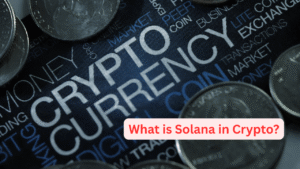 What is Solana in Crypto? A Beginner-Friendly Guide with Examples
What is Solana in Crypto? A Beginner-Friendly Guide with Examples
Solana (SOL) is one of the fastest-growing blockchain platforms in the world of cryptocurrency. Known for its blazing-fast transaction speeds and ultra-low fees, Solana has emerged as a top contender to Ethereum for hosting decentralized applications (dApps), NFTs, and DeFi projects.
In this post, we’ll break down what Solana is, how it works, its key features, use cases, and why it’s gaining so much attention in the crypto space.
What is Solana (SOL)?
Solana is a high-performance blockchain network created to support scalable and user-friendly decentralized applications. It was founded in 2020 by Anatoly Yakovenko, a former Qualcomm engineer, with a focus on solving the scalability issues that plague older blockchains like Ethereum and Bitcoin.
Its native cryptocurrency is called SOL, and it’s used to pay transaction fees, stake on the network, and participate in governance.
Why is Solana Important?
Blockchain technology has incredible potential, but many early blockchains struggle with speed, scalability, and cost. Solana aims to fix these issues by offering:
- High throughput (up to 65,000 transactions per second)
- Low transaction costs (usually less than $0.01)
- Fast block finality (400ms on average)
This makes Solana one of the most efficient and scalable blockchain platforms currently available.
How Does Solana (SOL) Work?
Solana achieves its high speed and scalability through a unique consensus mechanism called Proof of History (PoH), combined with Proof of Stake (PoS).
🔹 Proof of History (PoH)
Unlike Bitcoin or Ethereum, which timestamp transactions using the traditional block structure, Solana uses a built-in clock. This allows the network to order transactions before consensus, speeding up validation and reducing congestion.
🔹 Proof of Stake (PoS)
Validators (network participants) are chosen based on how many SOL tokens they stake. They are responsible for processing and validating transactions, earning rewards in return.
Together, PoH and PoS allow Solana to run thousands of transactions in parallel—without sacrificing decentralization or security.
Key Features of Solana
Here are some standout features that make Solana unique in the crypto space:
1. Speed and Scalability
Solana can process up to 65,000 transactions per second (TPS), far exceeding Ethereum (~15 TPS) and Bitcoin (~7 TPS). This makes it ideal for high-demand applications like DeFi and gaming.
2. Low Fees
Average transaction fees on Solana are less than $0.01, making it highly cost-effective for users and developers alike.
3. Smart Contract Support
Solana supports smart contracts and Solana Programs (its version of smart contracts), which power decentralized applications (dApps), NFTs, games, and DeFi protocols.
4. Developer-Friendly Tools
Solana offers powerful SDKs, APIs, and a rapidly growing developer ecosystem. Tools like Solana CLI, Anchor Framework, and Phantom Wallet make development and usage easy.
Real-World Use Cases and Examples
Solana isn’t just a promising idea—it already powers a wide range of real-world applications in the crypto space:
🔸 1. NFT Marketplaces
Example: Magic Eden
Magic Eden is the leading NFT marketplace on Solana. It allows users to mint, buy, and sell Solana-based NFTs with minimal fees.
🔸 2. DeFi Projects
Example: Raydium
Raydium is a decentralized exchange (DEX) that offers fast swaps, yield farming, and liquidity pools—all on Solana’s fast infrastructure.
Example: Marinade Finance
Marinade lets users stake SOL and receive a liquid staking token (mSOL), combining staking rewards with DeFi utility.
🔸 3. Blockchain Gaming
Example: Star Atlas
Star Atlas is a next-gen metaverse game built on Solana. It features real-time graphics and an open economy driven by blockchain and NFTs.
🔸 4. Wallets
Example: Phantom Wallet
Phantom is a Solana-native wallet extension and mobile app that allows users to store SOL, interact with dApps, and manage NFTs with ease.
The Role of SOL Token
The SOL token serves several functions within the Solana ecosystem:
- Transaction Fees: All fees on the Solana network are paid in SOL.
- Staking: Users can stake SOL to earn rewards and help secure the network.
- Governance: SOL holders will eventually participate in future governance decisions (once governance features are fully rolled out).
- Utility: SOL is required to run programs, interact with dApps, and deploy smart contracts on Solana.
Solana vs Ethereum vs Bitcoin
| Feature | Solana (SOL) | Ethereum (ETH) | Bitcoin (BTC) |
|---|---|---|---|
| TPS | Up to 65,000 | ~15 | ~7 |
| Fees | <$0.01 | $1–$20+ | $1–$5 |
| Smart Contracts | Yes | Yes | No |
| Consensus | PoH + PoS | PoS (since ETH 2.0) | Proof of Work |
| NFT Support | Yes | Yes | Limited |
Challenges and Criticisms
Despite its success, Solana is not without flaws:
🔸 Network Outages
Solana has suffered several network slowdowns and outages, typically caused by bots spamming the network or bugs in the codebase.
🔸 Centralization Concerns
Solana requires high-performance hardware to run validator nodes, which may limit decentralization. Critics argue that fewer people can afford to participate, potentially concentrating control.
🔸 Competition
Solana faces stiff competition from other blockchains like Ethereum, Polygon, Avalanche, and Cardano, each offering its own advantages.
Future of Solana (SOL)
Despite the challenges, Solana continues to grow with strong community support, developer activity, and adoption. Key developments in the pipeline include:
- Firedancer Validator Client – designed to improve scalability and uptime
- Better tooling and SDKs – making dApp development even easier
- Increased DeFi and NFT activity – expanding use cases across industries
Final Thoughts
Solana (SOL) is more than just another cryptocurrency. It’s a next-generation blockchain designed for high-speed, low-cost, and scalable decentralized applications. From NFT platforms to DeFi protocols and blockchain games, Solana is powering a diverse range of projects and attracting both developers and investors.
If you’re looking to explore a powerful alternative to Ethereum—with faster speeds and lower fees—Solana is definitely worth your attention.